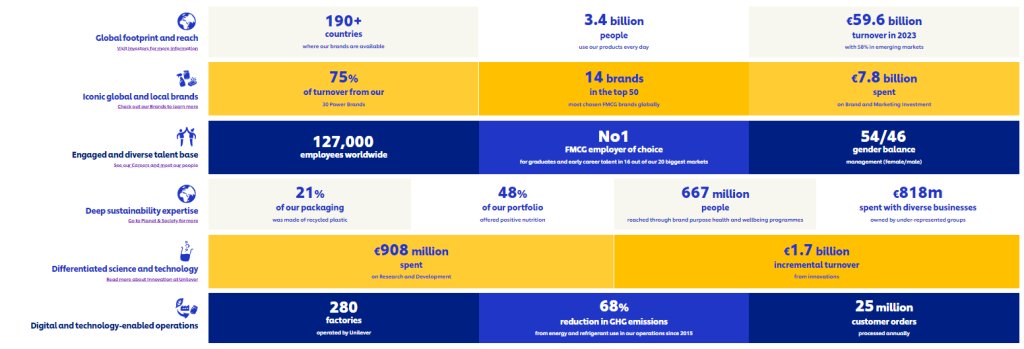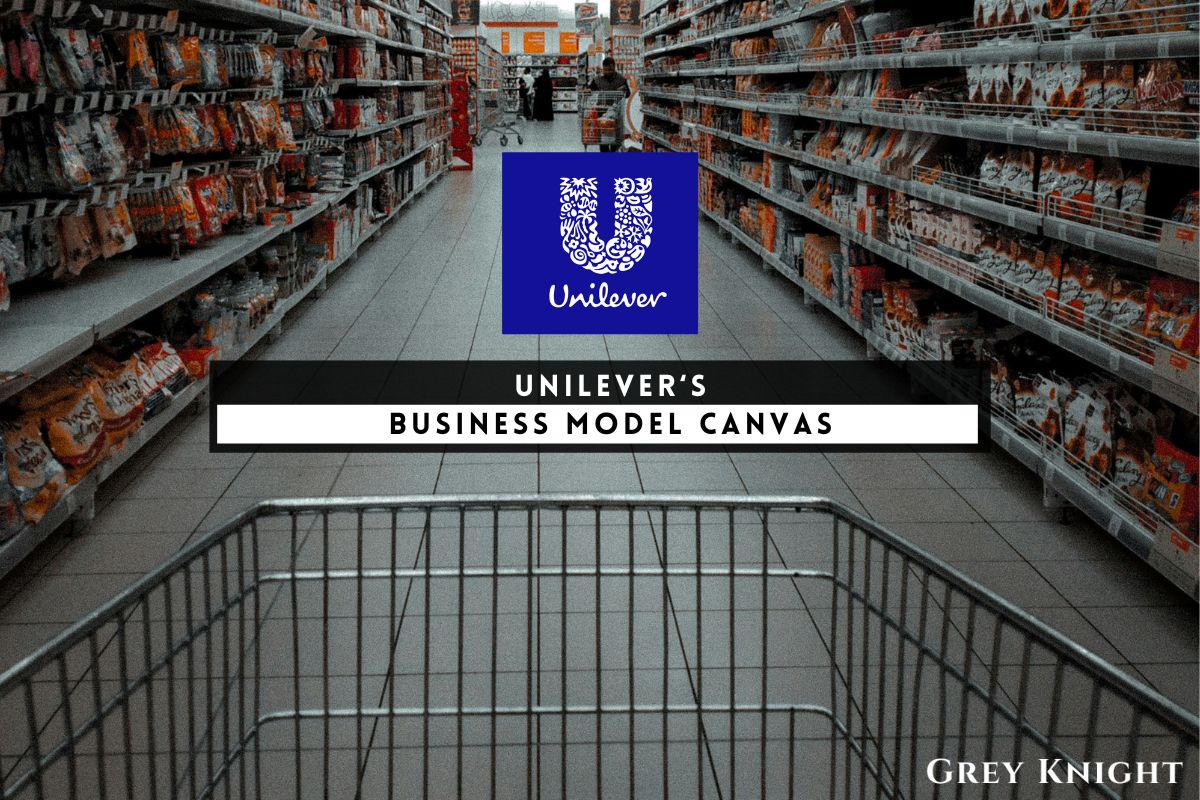Table of Contents
ToggleA Brief History of Unilever
Unilever PLC has a rich history dating back to the 19th century. The company was created in 1930 through the merger of Dutch margarine producer Margarine Unie and British soap maker Lever Brothers.
Margarine Unie was established in the Netherlands in 1927, and quickly grew to become one of the leading margarine producers in Europe. Lever Brothers, founded in the United Kingdom in 1885, made a name for itself as a manufacturer of household and personal care products, including the popular Sunlight soap.
The merger of these two companies created a global powerhouse in the consumer goods industry. Unilever rapidly expanded its product portfolio and geographical reach, becoming a leading player in the global market for food, home, and personal care products.
Over the years, Unilever has continued to grow and evolve, acquiring numerous well-known brands and expanding its operations to new markets. The company’s commitment to sustainability and social responsibility has also been a key focus, leading to initiatives such as the Unilever Sustainable Living Plan.
Today, Unilever is a multinational company with a diverse range of brands and products, operating in over 190 countries worldwide. The company’s long and storied history has firmly established it as a respected and influential player in the global consumer goods industry.
Who Owns Unilever?
Unilever PLC is owned by a diverse group of shareholders including individual investors, institutional investors, and mutual funds. As a publicly traded company, it is listed on the London Stock Exchange and is part of the FTSE 100 index. The top 10 shareholders of Unilever PLC include major institutional investors such as The Vanguard Group, BlackRock, Inc., and State Street Corporation. These institutions hold significant stakes in the company and have a substantial impact on its governance and strategic decisions. Additionally, the company’s shares are also widely held by individual investors, giving it a broad and diverse ownership structure.
Unilever Mission Statement
Unilever PLC’s mission is to create a better future every day by providing products that improve the lives of consumers around the world. They strive to achieve sustainable growth and make a positive impact on the environment, society, and economy. Unilever is committed to promoting diversity, inclusion, and equality within its workforce and ensuring that their products are produced and distributed in an ethical and responsible manner. Their mission is rooted in their belief that by taking care of people and the planet, they can build a successful and sustainable business.
How Does Unilever Make Money?
Unilever PLC’s business model revolves around selling a wide range of consumer goods, including food, beverages, personal care products, and cleaning agents. The company makes money through the sale of these products to consumers worldwide, with a focus on delivering high-quality, sustainable products that meet the needs of a diverse customer base. Unilever generates revenue through sales to retailers, wholesalers, and online platforms, as well as through its own branded store locations. Additionally, the company leverages its strong brand presence to engage in strategic partnerships and collaborations, further driving its revenue stream. Overall, Unilever’s business model is based on providing essential everyday products to consumers while also embracing sustainability and social responsibility.
Unilever Business Model Canvas
The business model canvas is a strategic management tool that provides a visual representation of a company’s business model. It allows for a clear understanding of the key components of a business and how they interact with each other. By mapping out these components, businesses can identify their strengths and weaknesses, as well as opportunities for growth and improvement. In this Business Model Canvas for Unilever PLC, we will outline the key elements of their business model to gain a better understanding of how the company operates and generates value.
Customer Segments:
-Unilever PLC caters to a diverse range of consumer segments, including individuals, families, and businesses.
-It targets consumers across different demographics, including age, gender, and income level.
-The company also serves customers across various geographic locations, both in developed and developing countries.
Value Propositions:
-Unilever offers a wide range of consumer goods and products, including personal care, food and beverage, and home care products.
-It focuses on providing high-quality, sustainable, and environmentally friendly products that meet the diverse needs and preferences of consumers.
-The company also emphasizes its commitment to social and environmental responsibility, which is reflected in its products and initiatives.
Channels:
-Unilever distributes its products through a variety of channels, including retail stores, supermarkets, online platforms, and direct sales.
-The company also leverages third-party distributors and partners to reach a wider customer base.
-It utilizes multiple marketing and promotional channels, such as advertising, social media, and influencer partnerships.
Customer Relationships:
-Unilever maintains strong customer relationships through various initiatives, including loyalty programs, customer feedback mechanisms, and responsive customer service.
-The company also focuses on building trust and credibility with consumers through transparent communication and ethical business practices.
Revenue Streams:
-The primary revenue stream for Unilever is the sale of its consumer goods and products.
-The company also generates income through licensing and franchising agreements, as well as other strategic partnerships.
Key Resources:
-Key resources for Unilever include its manufacturing facilities, research and development capabilities, brand equity, and distribution networks.
-The company also relies on its workforce, supply chain, and technological infrastructure to support its operations.
Key Activities:
-Key activities for Unilever involve product development and innovation, manufacturing and production, marketing and sales, and distribution and logistics.
-The company also places a strong emphasis on sustainability and corporate social responsibility initiatives.
Key Partners:
-Unilever partners with a variety of stakeholders, including suppliers, distributors, retailers, and industry organizations.
-The company also collaborates with non-governmental organizations, governments, and other entities to address social and environmental challenges.
Cost Structure:
-Unilever’s cost structure encompasses expenses related to raw materials, production, marketing and advertising, distribution, and administrative overhead.
-The company also invests in sustainability, research and development, and corporate social responsibility efforts, which contribute to its overall cost structure.
Unilever’s Competitors
Unilever PLC faces strong competition in the consumer goods industry, with several global companies vying for market share. Some of its top competitors include Procter & Gamble, Nestle, The Coca-Cola Company, Colgate-Palmolive, and L’Oréal. These companies also offer a wide range of consumer products such as personal care, food and beverages, and home care items, providing stiff competition for Unilever in both domestic and international markets. Unilever PLC must continuously innovate and adapt to consumer preferences in order to stay competitive in this crowded market.
Unilever SWOT Analysis

Strengths:
1. Strong portfolio of well-known brands across various consumer goods categories
2. Global presence with operations in over 190 countries
3. Diverse product offerings catering to a wide range of consumer needs
4. Emphasis on sustainable and socially responsible business practices
Weaknesses:
1. Vulnerability to macroeconomic and geopolitical factors due to global operations
2. Limited presence in emerging markets compared to some competitors
3. Reliance on suppliers for raw materials, with potential for supply chain disruptions
Opportunities:
1. Growing consumer interest in sustainable and eco-friendly products
2. Expansion into emerging markets with untapped potential for growth
3. Innovation and investment in technology to improve operational efficiency
Threats:
1. Intense competition from both established and emerging players in the consumer goods industry
2. Regulatory changes and trade barriers affecting international operations
3. Fluctuating commodity prices impacting production costs
Concluding Analysis
So, after delving into the business model of Unilever PLC, it is clear that the company’s focus on sustainability, innovation, and consumer-centric approach has positioned it for success in the years to come. As an analyst, I am optimistic about the future of the business. With the ever-growing demand for sustainable and ethically sourced products, Unilever’s strategic direction aligns perfectly with the evolving market trends. Additionally, its commitment to driving positive social and environmental change not only sets it apart from its competitors but also demonstrates a genuine dedication to making a difference in the world. Overall, I foresee a bright and prosperous future for Unilever PLC as it continues to lead the way in the consumer goods industry.
Additional Resources
To keep learning and advancing your career, we highly recommend these additional resources:
Business Model Canvas of The Top 1,000 Largest Companies by Market Cap in 2024
A List of 1000 Venture Capital Firms & Investors with LinkedIn Profiles
Peter Thiel and the 16 Unicorns: The Legacy of Thiel Fellowship












